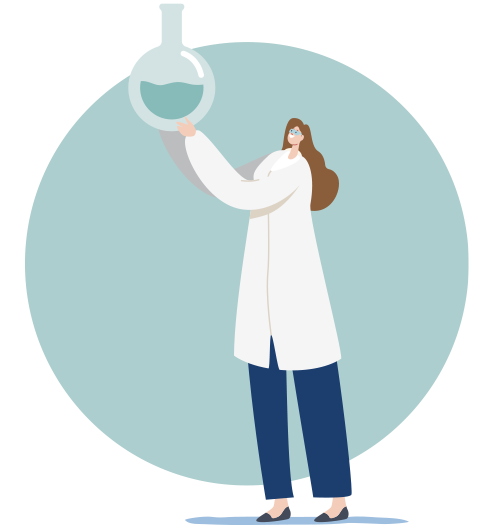Overview
Through the online Medical Laboratory Assistant program, you’ll build the skills and knowledge you need to start a successful, new, and rewarding career in the industry. Through self-paced courses and a required externship*, you’ll learn the fundamentals of being a lab assistant, from administrative and ethical considerations to clinical procedures. Learners will receive a hands-on venipuncture kit as part of their training to help them better understand venipuncture processes and procedures. Your training will also help you prepare and sit for industry exams such as the CPT and CMLA in order to become a certified medical lab assistant.
*CareerStep does not guarantee externships. A learner’s placement in and completion of an externship is solely the learner’s responsibility and may be subject to additional requirements, such as a background check and successful completion of a CareerStep course. This is particularly important for learners seeking to complete their externship in Alabama, District of Columbia, Indiana, Louisiana, Minnesota, Nebraska, Nevada, Pennsylvania, Tennessee, Texas, Washington, and Wyoming. Please note that CareerStep will not sign agreements with sites in the above-referenced states or provide evidence of insurance to those sites.
Study Format
Training for a career in the medical field is serious business, so you want to make sure you do it right. Right is different for everyone, which is why CareerStep’s online Medical Lab Assistant Program allows you to learn from anywhere, at any time – all at your own pace.
Learn from home (or anywhere)
Study online (anytime)
Support
You might be training online, but you’re never alone. We’ll back you every step of the way with 1:1 coaching, community assistance, and flexible payment options.
![]() 1:1 support
1:1 support
![]() Phone, live chat, and email
Phone, live chat, and email
Medical Laboratory Assistant Program Outline
Our online training program covers hours of training and topics such as phlebotomy and anatomy and physiology so you can build the skills you need to start a career on your schedule.
Program Orientation: Medical Lab Assistant
- Learn about the role of the medical laboratory assistant and the opportunities for employment in the field.
Communication and Customer Service in the Healthcare Office
- Understand how strong written, verbal, and non-verbal communication impact the patient experience and outcomes in a healthcare setting.
- Learn professional communication techniques for a healthcare office.
Anatomy and Physiology Essentials
- Be able to name and explain all of the systems of the body.
- Describe the structure of the epidermis, dermis, and hypodermis.
- Describe the process of osteogenesis.
- Identify the bones in cell formation. Describe the overall structure of the muscular system.
- Describe the general functions of the nervous system.
- Describe the major sources of carbohydrates, proteins, and lipids.
- List the general functions of the kidney.
- Identify the mechanisms of regulating water input and output.
- Describe the fetal stages and prenatal period.
Infection Control
- Understand the causes of infectious and communicable diseases and the diagnostic measures to identify them.
- Learn the protective measures and treatments required to manage and control the spread of infectious diseases.
Fundamentals of HIPAA
- Build an understanding of HIPAA, including what it is, how it works, and the importance of privacy and security in healthcare.
Law, Liability, and Ethics for Healthcare
- Learn about healthcare laws and regulations, confidentiality, malpractice, and professional ethics.
Externship Readiness Skills
- Prepare for your required externship by learning about time management skills, stress management skills, professional image, and more.
Phlebotomy
- Understand common phlebotomy techniques and the correct steps in the process of taking blood.
- Learn how to prepare and handle a blood sample.
Venipuncture Labs
- Describe the importance of taking a medical history before performing any invasive procedures
- Describe the importance of adhering to basic principles of sterility and asepsis
- Describe the basics principles of venipuncture
- Discuss various techniques of drawing venous, arterial, and capillary blood
- Discuss various types of injections (e.g. local and regional anesthetic injections)
Testing and Laboratory Procedures
- Understanding procedures and processes used to obtain specimens for testing.
- Review common techniques and processes frequently used in medical laboratories.
Medical Lab Assistant
- Understand and implement laboratory safety rules that must be followed to guard against chemical, physical, and biological hazards.
- Understand the different types of tests and their importance in diagnosing various diseases and conditions.
Applying For Your Required Externship*
- Review the externship preparation resources.
- Understand the externship site placement process and considerations.
Externship*
- Complete your externship.
- Develop hands-on skills.
Program Completion: Medical Lab Assistant
- Prepare to finish your course in medical lab assisting.
Medical Laboratory Assistant Certifications
CareerStep’s online Medical Laboratory Assistant training covers the knowledge and skills you need to successfully sit for industry-recognized certification. We want to support our learners in securing the certification that fits based upon your career goals and current job requirements. Your training includes up to two different exam vouchers for the certifications listed below, relevant to your training – a significant value add of several hundred dollars.
Certified Medical Laboratory Assistant (CMLA)
The CMLA credential is an entry-level certification for professionals who perform, or assist in performing, clinical laboratory and administrative tasks - certified by the American Medical Technologists (AMT).
Certified Phlebotomy Technician (CPT)
Demonstrate your capability to do intravenous blood draws with the CPT from the National Healthcareer Association.
Documents
Ready to Get Started?
Call (800) 411-7073
to speak with a career advisor

